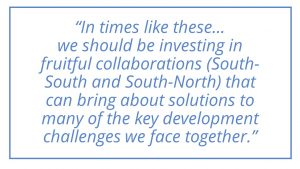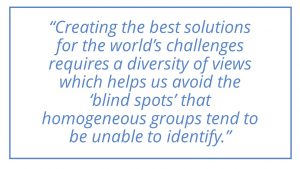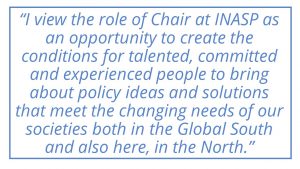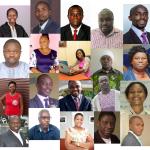Why I’m excited to join INASP: Introducing INASP’s new Chair
Late this summer we announced the appointment of Lizbeth Navas-Aleman as our incoming Chair of the Board of Trustees – heralding INASP’s shift to the South. In this post, Lizbeth tells us more about herself and what excites her most about joining INASP.
 INASP’s vision to put research and knowledge at the heart of development resonates deeply with the curious researcher in me.
INASP’s vision to put research and knowledge at the heart of development resonates deeply with the curious researcher in me.
Many successful repositories of knowledge and know-how are in the Global South. This wealth of knowledge needs to be shared in order to support the development opportunities of other countries and also within countries. Exchanging information in a purposeful manner so it actually becomes part of the implementation of development policies takes time and funding, two resources that are not abundant now, particularly when challenges such as COVID have put enormous pressures on governments, firms and NGOs.
And yet, it is precisely in times like these when we should be investing in fruitful collaborations (South-South and South-North). Such collaborations can enable solutions to many of the key development challenges we face together such as climate change, pandemics, poverty, inequality and the protection of human rights.

An organisation like INASP, which is nimble and trusted in the Global South but very busy with current projects, needs to find the time to think strategically, together with partners from the Global South, about how to develop and fund initiatives that make the best use of resources and are relevant in several contexts.
What inspired you to join INASP as Chair and how do our vision and mission connect to your own interests and experience?
I’ve always been an extremely curious person. Academically speaking, I always enjoyed the process of designing the hypotheses, the research questions and, of course, carrying out the fieldwork. Finding the answers is what motivates me initially but I also enjoy the process of getting the answers, particularly when it involves connecting with people, feeling like I’m being let into another layer of belonging and complexity because now ‘I understand’.
Working with people from different cultural backgrounds has been a frequent motivator in my career and that has led me to put a lot of effort into learning other languages and enjoying how new spaces open up when you are able to access them in their own language.
Equalities and human rights are also very important to me – proactively engaging in inclusive practices and attitudes towards everyone regardless of disability, gender, sexual orientation, race, nationality and religion (or lack of it!).
I feel energised when I have conversations with people from different organisations, backgrounds and (often) in different languages. In my consultancy and teaching work, I like to collaborate with people and organisations that complement my skillset (value chain analysis, industrial organisation, policies to promote industrial clusters). In that way we usually end up creating a new framework or methodology to tackle a client’s challenge and that’s quite motivating: creating something new, a custom-made solution for someone’s problem or policy challenge.

When combined with INASP’s concern with ensuring that all voices are heard, including Southern voices, the appeal to my sense of justice and inclusivity made the opportunity to work with INASP hard to resist. INASP’s commitment to working with diverse audiences, organisations and countries made also practical sense to me. My experience of over 20 years working in international development has shown me that creating the best solutions for the world’s challenges requires a diversity of views, which helps us avoid the ‘group think’ that homogeneous groups tend to have.
What do you hope to bring to your new role as INASP Chair?
I had the fortune to be invited to present my research at MIT Sloan right after finishing my PhD and one of the people in the audience was Michael J. Piore, a giant in the innovation world. He was very kind and gave me a copy of the book he wrote with Richard K. Lester (Innovation, 2006). I was a bit starstruck, obviously, but what really stayed with me was his metaphor of ’the party hostess’ with regards to innovation. This metaphor makes us reflect on the role of someone that wants to brings about innovation, change and solutions by getting people from different walks of life to talk to each other and help them collaborate effectively.
I view the role of Chair at INASP as an opportunity to create the conditions for talented, committed and experienced people to come to talk with INASP and with each other in ways that bring about policy ideas and solutions that meet the changing needs of our societies both in the Global South and also here, in the North.
What do you think the future holds for INASP and our work?
In my early conversations with INASP’s partners in the Global South, I’ve discovered that there’s a deep sense of trust in the organisation and enthusiasm for continuing joint work. It is unusual, in my experience, for an organisation the size of INASP to have such global reach. This is a source of social capital that can help facilitate productive networks of development organisations and provide quality assurance if needed until the organisations in the network develop their own trusted relationships with each other. INASP can expand their reach beyond their current geographical areas of action.
organisation the size of INASP to have such global reach. This is a source of social capital that can help facilitate productive networks of development organisations and provide quality assurance if needed until the organisations in the network develop their own trusted relationships with each other. INASP can expand their reach beyond their current geographical areas of action.
I believe INASP’s tried and tested methodologies to support researchers and knowledge ecosystems would be very welcome in many parts of Latin America and Asia. I think that will require working with intermediary partner organisations in these areas that can work both in English and in local languages. I’ll be happy to advise on and support such strategies. There are also opportunities to partner with complementary organisations in order to develop new methodologies and solutions for development challenges (‘innovation’).
INASP’s valued current services can be deployed in new geographical areas in order to support other initiatives whereby new services and solutions could be created to tackle different problems. I believe there is an evolving role for INASP both as a provider of services and as a generator of innovative bespoke solutions to development challenges.

 Previous Post
Previous Post Next Post
Next Post


